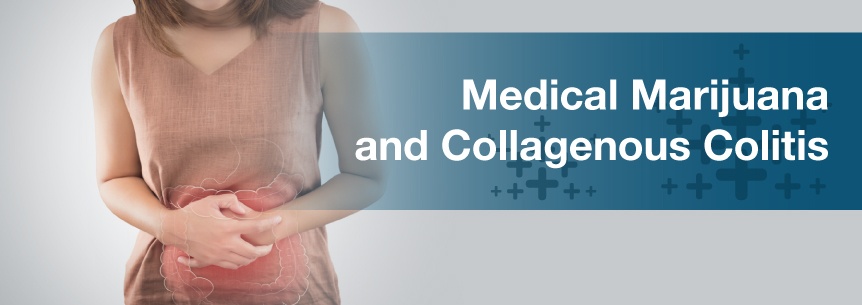
Collagenous colitis is one primary type of microscopic colitis. Lymphocytic colitis is the other. Collagenous colitis symptoms may be sporadic and can vary in severity. Some symptoms can cause so much discomfort, they affect your quality of life. This is where medical marijuana and collagenous colitis treatment steps in.
Collagenous colitis (CC) impacts your large intestine. While it isn’t common, if you have the condition, it can cause episodes of stomach pain and watery diarrhea. Older adults tend to get it more than others, but the disease can affect children and younger adults. Women tend to develop CC more often than men.
Collagenous colitis is one form of inflammatory bowel disease (IBD), which is a group of disorders causing either large or small intestine inflammation. CC is a form of microscopic colitis causing large intestine inflammation doctors can see through a microscope.
Your large intestine plays a significant role in your digestive gastrointestinal (GI) tract. A primary responsibility of your large intestine is to reabsorb electrolytes and water. With collagenous colitis, immune system inflammatory cells travel to your large intestine. They then cause inflammation and swelling. In rare cases, the cells may also go into your small intestine.
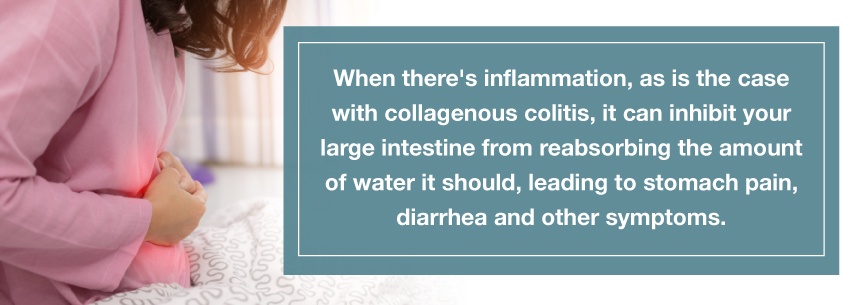
When there’s inflammation, as is the case with collagenous colitis, it can inhibit your large intestine from reabsorbing the amount of water it should, leading to stomach pain, diarrhea and other symptoms. Inflammation can also lead to a buildup of extra collagen, which is a supportive, stretchy substance, in your small intestine wall too, also contributing to your discomfort.
CC symptoms can be mild or severe, recurring from time to time. Common collagenous colitis symptoms are:
Other less common CC symptoms are:
Diarrhea may come on and go away over a period of weeks or months — even years. Some people receive a misdiagnosis of irritable bowel syndrome (IBS) since they share similar symptoms.
Experts are attempting to figure out what causes the large intestine inflammation resulting in CC. Some theories include it being caused by:
Bloody bowel movements or increased colon cancer risks aren’t associated with collagenous colitis.
CC usually appears to have a completely benign clinical course responding well to limited treatment. In some occasions, certain extracolonic conditions may influence the course of treatment such as:
Fatalities, although rare, and complications, sometimes severe, have been linked directly to colitis. You may develop toxic megacolon and toxic colitis. Small intestinal inflammatory conditions and concomitant gastric conditions, including more severe collagenous inflammatory disease and celiac disease, may occur as a result of collagenous colitis.
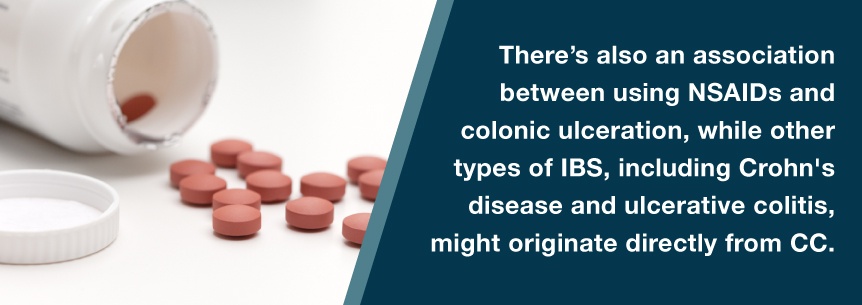
There’s also an association between using NSAIDs and colonic ulceration, while other types of IBS, including Crohn’s disease and ulcerative colitis, might originate directly from CC.
Physicians have also seen colonic fractures, mucosal preformation and tears or submucosal “dissection,” possible from colonoscopic air insufflation and lymphoproliferative disease with this condition. Increased intraluminal pressures occurring during radiological colon imaging may also lead to similar changes. Neoplastic colon conditions might occur during CC, including neuroendocrine tumors and colon carcinoma.
CC tends to resolve spontaneously, but many individuals with the condition do have recurrent symptoms. Those with an ongoing condition often also struggle with depression or anxiety. In this case, symptoms can include pain, fatigue, diarrhea, incontinence and other symptoms that can make a person feel down when having to deal with them on a daily basis.
Many individuals with a recurring or chronic condition become depressed. In fact, depression is quite common with chronic illness. Around one-third of individuals with a serious health disorder also experience depression symptoms.
The prevalence of anxiety is also high in people who have a condition with recurring symptoms, and, like depression, often remain untreated despite substantial adverse consequences on patients’ health. In the chronic disorder population, numerous clinical groups have provided recommendations for practices of screening depression.
Statistics about collagenous colitis according to the National Institutes of Health (NIH) include:
The first description of collagenous colitis occurred in 1976 when a chronic diarrhea patient undergoing a rectal biopsy showed signs of a thick subepithelial collagenous deposit in their colorectal mucosa. Historically, it’s occurred in females of middle-age with a peak prevalence around the age of 60 through 70 years old. However, it’s described in all different age groups, children included.
Sometimes collagenous colitis goes away by itself without treatment, but some individuals do require treatment. Your doctor will decide on the best course of treatment for you depending on how severe your symptoms are.
Your physician may suggest you make a change to your diet. A diet change is typically the first plan of any course of treatment.
Some diet changes they may recommend may include:
Usually, you won’t have any side effects from adjusting your diet, but you need be sure you’re getting adequate nutrition.
Your doctor will go over any current medications you’re taking and make recommendations about whether or not you should continue or stop taking them. They may also prescribe you new medicines, such as the steroid Budesonide, for treating your condition.
Some medications (and their side effects) are listed below:
If medication and diet changes aren’t helping, your doctor might suggest surgery. Generally, surgery isn’t a standard treatment for collagenous colitis, so they’ll only recommend surgery in extreme cases.
A couple of types of surgery for CC are:
Surgery comes with risks of infection and complications.
Currently, there isn’t any curative therapy for collagenous colitis. The goal of treatment is to bring about remission, three bowel movements a day or one watery bowel movement a day with improved quality of life following.
Before introducing Budesonide, which is now a commonly used steroid to treat collagenous colitis, selecting treatment depended hugely on the individual doctor’s experience based on observing data closely while guiding management through several randomized trials. Controlled trials already existing have been in further evaluating the effectiveness of Budesonide and other medications.
Cannabinoids help decrease intestinal inflammation. The non-psychotropic, safe ingredient of cannabis, cannabidiol, for example, provides pharmacological effects such as being an antioxidant and helping with an inflamed gut.
Research suggests the cannabinoid CB1 and CB2 receptors play a role in regulating gastrointestinal inflammation in animal models with experimental colitis. Studies using THC indicated good results in TNBS-induced colitis.
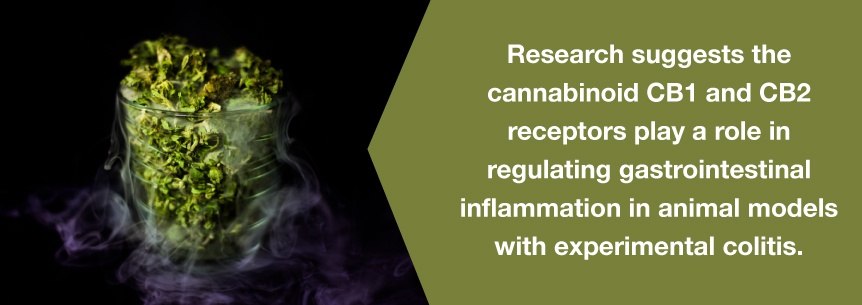
Cannabinoids tap into your ECS or endocannabinoid system in your gastrointestinal tract. Cannabis compounds cause biochemical gut changes. With CC, the changes are beneficial.
The cannabinoids in medical marijuana interact directly with the vagal nerve and regional immune cells. Medical weed has immunomodulatory properties and has an impact on messages sent between the brain and gut.
If you’re nauseous, inhaling cannabis blocks gut messages to your brain telling it you have to vomit. This is a why marijuana has such powerful anti-nausea properties. Research shows THC binds to the vagal nerve CB1 receptor, which alters brain-gut communication, leading to reduced nausea and vomiting and pain perception changes.
Medical marijuana not only can help ease your anxiety and depression associated with having collagenous colitis, but it can also help with inflammation, nausea and pain.
Some overall good cannabis and collagenous colitis strains include:
Because researchers know CBD effectively tackles inflammation, more CBD-rich cannabis strains are being made to fight extreme inflammation in individuals. Some good inflammation-fighting strains are:
Most all medical cannabis strains help treat nausea, however, some work better than others. Some of the most popular strains to treat nausea include:
You’ll also find various strains of the medical pot plant to significantly reduce pain and discomfort significantly. Some include:
Along with choosing the right marijuana for collagenous colitis strain to help treat your symptoms, you should also find the best method of delivery. Each delivery method provides a different effect and there are many factors to determine what consumption method is best for you.
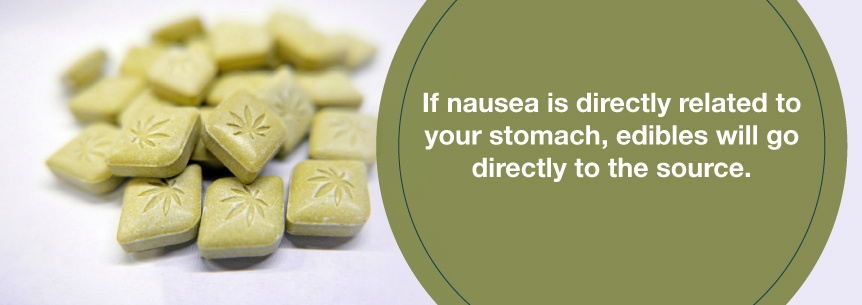
Evaluate what your symptoms are and how they’re occurring to help you figure out what your body requires. You’ll still want to consult with a cannabis doctor or dispensary even if you think you have it under control. They can give you recommendations on different strains and methods of consumption and how they should affect you. They can also advise you on your next step if a particular strain or method doesn’t work properly.
Now that you’ve obtained some information on marijuana and collagenous colitis and you’re interested in trying out this form of treatment, your next step is to find a qualified physician who can give you your medical cannabis recommendation letter. MarijuanaDoctors.com can connect you to a cannabis-certified doctor. Find a qualified cannabis doctor and browse our extensive list of cannabis dispensaries where you’ll shop for your medical pot products.
Find A Doctor Find A Dispensary